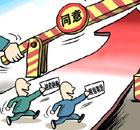Foreign and Military Affairs
Foreign backing gives Dalai Lama no room but doom
(Xinhua)
Updated: 2010-02-20 11:25
 |
Large Medium Small |
BEIJING: In his five decades of exile, the Dalai Lama has never stopped plotting to seek "Tibet independence" through allying with foreign forces to internationalize the so-called "Tibet issue" and press the Chinese government.
In recent years, he tried desperately to make international appearances, begging for visits to foreign countries and meeting with state leaders. On Thursday, US president Barack Obama met with the Dalai Lama despite stern warnings from China.
|
||||
However, he must have forgotten that the fate of Tibet never relies on him and a few foreigners but has always been decided by all the Chinese people, including all ethnic minorities in the region.
"Tibet issue" a pseudo proposition
The so-called "Tibet issue" was fabricated by imperialists to serve their intention of invading, partitioning and containing China.
Back in 1888 and 1904, troops of the United Kingdom intruded into Tibet twice, but failed to take it away from China due to strong revolt from the Tibetan people backed by the whole Chinese nation. Since then, foreign forces turned to cultivating their agents for "Tibet independence" in the upper strata of Tibet's local ruling echelon. After the World War II, the United States directly interfered with Tibetan affairs, sabotaging China's cause of national unification and liberation of the people.
In order to maintain the theocratic feudal serfdom, local rulers in Tibet colluded with foreigners to first violently resist the peaceful liberation of Tibet and then start an armed rebellion against democratic reforms.
In 1954, the US Central Intelligence Agency (CIA) recruited spies among Tibetans, sent them for training and then secretly took them back to China. The US had been supplying weapons and ammunition to these spies through secret border transport and air-dropping.
In March 1959 when the Dalai Lama and his followers failed in an insurgency and fled Tibet, he was closely accompanied by a CIA radio operator who helped keep contact with outside forces and guided them to air-drop materials to the fleeing group.
Since 1959, the Dalai Lama has been relying on foreign forces. A declassified document showed the US spent up to $1.66 million in 1964 on the "Tibet project" alone. The money was spent supporting 2,100 "Tibet guerrillas," buying equipment and educating senior "Tibet officials." Other expenditures included transport and intelligence training.
Meanwhile, the Dalai Lama received an allowance of $180,000, a huge amount of money compared with a salary of $100,000 for the then US president.
We can say the "Tibet issue" would have vanished long ago if the foreign forces had not spared no effort to support the Dalai Lama.
In recent years, foreign financial support to the Dalai Lama and his followers became a little more hidden, but remained equally strong.
Despite the serious financial crisis, the US government's 2009 fiscal budget planned $16.8 million for the Dalai clique, an increase of 25 percent over the previous year. It also "paid" the clique in the name of non-governmental organizations and foundations or by inviting the Dalai Lama for sermons.
Another approach adopted by foreign forces to sensationalize the "Tibet issue" is to prettify the Dalai Lama and heighten his status.
In 1989 when the world witnessed drastic changes, the Dalai Lama was awarded the Nobel Peace Prize. Various "honors" came to him afterwards, which became "reasons" for some politicians to meet with him.
Even in the poor and weak old China, imperialists and local separatist forces in Tibet could not succeed in splitting the region from China. Any "Tibet independence" conspiracy nowadays is not different from a farce as the socialist China grows increasingly stronger.











